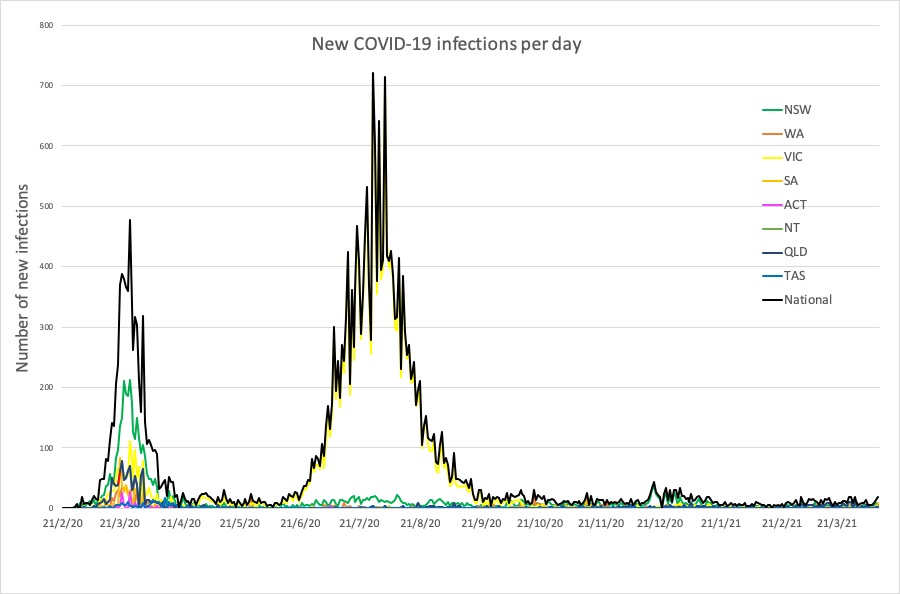And antibiotic and antiviral prescriptions dropped 40% at start of the pandemic.
Welcome to The Medical Republic’s COVID Catch-Up.
It’s the day’s COVID-19 news in one convenient post. Email bianca@biancanogrady.com with any tips, comments or feedback.
14 April
- Johnson & Johnson’s COVID-19 vaccine rollout paused due to clotting fears.
- Antibiotic and antiviral scripts plummeted during pandemic.
- Study across 21 countries finds no evidence of increased suicide rates during pandemic.
- Seventh week of increased new COVID-19 infections and deaths globally.
- Latest COVID-19 infection numbers from around Australia.
The Johnson & Johnson COVID-19 vaccine has suffered a set-back, with the US Centers for Disease Control and the US Food and Drug Administration jointly recommending a pause in rollout of the single-dose vaccine. The company themselves have issued a statement saying they will also pause the vaccine’s use in Europe.
The move comes after six cases of cerebral venous sinus thrombosis – thrombosis with low platelets – were reported in people who had received the vaccine.
The Australian federal government recently announced it would not be purchasing any of the vaccine.
Prescriptions for antibiotics and antivirals dropped by 40% in the first month of the pandemic, and have remained significantly lower since then, according to data from the Australian Institute of Health and Welfare.
The AIHW’s latest report on PBS and MBS usage during 2020 showed a sharp increase in PBS scripts during March 2020 – most significantly medications for respiratory conditions such as asthma and COPD – which coincided with the first pandemic lockdown in Australia.
However the following month saw a 10% lower use of Medicare services compared to the same period in 2019, which was especially evident for services related to elective surgery such as anaesthetics and operations.
There is no evidence of an increase in the rates of suicide during the pandemic, say the authors of a study which examined suicide rates in 21 middle- to high-income countries.
Writing in The Lancet Psychiatry, researchers reported that they found no significant increase in suicide rates across a range of countries and states, and there was even a decrease in suicide rates in some locations, including NSW, parts of Canada, Japan, Germany and New Zealand.
The authors commented that early signs of an increase in anxiety and depression during the pandemic does not appear to have translated into higher suicide rates.
They also suggested that financial support initiatives that had been introduced to reduce the financial burden of the pandemic could have acted as a buffer, but impending withdrawal of those in many locations could lead to increased stress.
“Suicide rates can rise during times of economic recession, so it is possible that the pandemic’s potential suicide-related effects are yet to occur,” they wrote.
The study confirms earlier data from Victoria, which also found no evidence of more suicides during the second wave lockdown.
The seventh week of global increases in new infection rates has seen an 11% rise in new cases of COVID-19 and 7% rise in deaths globally, according to the latest weekly data from the World Health Organisation.
Here are the latest COVID-19 infection numbers from around Australia to 9pm Tuesday:
National – 29,437 with 910 deaths
ACT – 123 (0)
NSW – 5344 (5)
NT – 112 (0)
QLD – 1506 (2)
SA – 674 (8)
TAS – 234 (0)
VIC – 20,487 (0)
WA – 957 (3)



